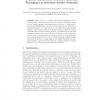Free Online Productivity Tools
i2Speak
i2Symbol
i2OCR
iTex2Img
iWeb2Print
iWeb2Shot
i2Type
iPdf2Split
iPdf2Merge
i2Bopomofo
i2Arabic
i2Style
i2Image
i2PDF
iLatex2Rtf
Sci2ools
APCSAC
2003
IEEE
2003
IEEE
A Router Architecture to Achieve Link Rate Throughput in Suburban Ad-hoc Networks
Static nodes, e.g. houses, educational institutions etc, can comprise ad-hoc networks using off-the-self wireless technologies with a view to bypass expensive telecommunication solutions. A suburban adhoc network (SAHN) aims to provide such an inexpensive broadband networking alternative for communities of cooperating users using wireless medium. There exists a plethora of efficient routing solutions for ad-hoc networks where nodes are mobile. However, less attention has been paid towards optimizing these protocols and developing a real routing system for ad-hoc networks where nodes are not mobile. In this paper we have made analyses of various router architectures and outlined a design framework to perform routing tasks in the SAHN efficiently. We have also presented a survey result for choosing a feasible realtime operating system for our development and deployment purposes.
Related Content
| Added | 04 Jul 2010 |
| Updated | 04 Jul 2010 |
| Type | Conference |
| Year | 2003 |
| Where | APCSAC |
| Authors | Muhammad Mahmudul Islam, Ronald Pose, Carlo Kopp |
Comments (0)

